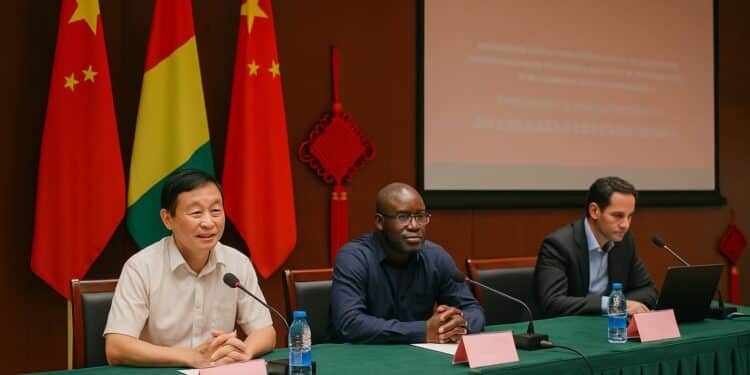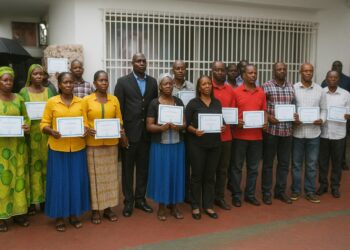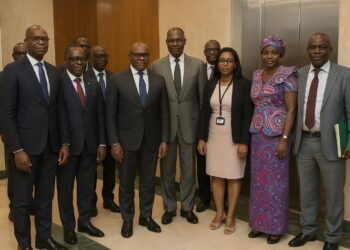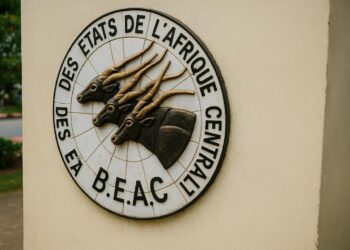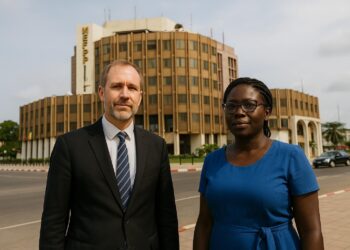Deepening Sino-Congolese Economic Ties
Brazzaville is recalibrating its external trade map after President Denis Sassou Nguesso’s recent state visit to Beijing. During a follow-up press briefing in the Congolese capital, Chinese ambassador An Qing underlined that bilateral relations now rest on “solid and pragmatic” foundations that extend far beyond traditional infrastructure finance.
China already stands as Congo-Brazzaville’s first export outlet, main commercial partner and dominant source of foreign direct investment. According to embassy data, the Central African economy recorded a 2.7 billion-dollar merchandise surplus with China last year, cushioning fiscal revenues as global hydrocarbons prices fluctuated.
Zero Tariff Regime and Trade Policy
The ambassador’s headline announcement concerned Beijing’s decision to grant zero-tariff entry to exports from fifty-three African states, including Congo, a measure first floated at the June coordinators’ meeting of the Forum on China–Africa Cooperation. Implementation, she said, is “a long-term initiative designed to consolidate development fundamentals.”
Removing customs duties could sharpen Congo’s competitiveness, enrich its export basket and accelerate industrial modernisation. Ambassador An expects the reform to enhance the business environment, crowd in additional capital and create a virtuous circle between agricultural processing, light manufacturing and logistics upgrades.
Chinese companies have begun scouting opportunities since the June announcement. Enquiries range from timber transformation plants in the northern departments to agro-industrial joint ventures along the fertile Niari corridor, illustrating how tariff preferences might redirect investment from raw extraction toward higher-value local production.
Sectoral Impact Assessment for Investors
Energy and mining still anchor Congolese exports, yet zero tariffs open new pathways for refined copper, sawn wood, cocoa derivatives and horticulture. Trade economists in Brazzaville estimate every percentage-point duty cut could raise non-oil shipments by 70 million dollars annually.
In agribusiness, duty-free access to a 1.4-billion-consumer market encourages scale economies. Producers of cassava starch and palm-oil derivatives can now model cashflows on Asian demand, provided they meet phytosanitary standards. The agriculture ministry is drafting guidelines to align certification processes with China’s General Administration of Customs requirements.
For the nascent manufacturing base, tariff elimination reduces price disadvantages linked to shipping distance. Experts from the Chamber of Commerce suggest that assembly of low-voltage electrical equipment, plastic piping and simple textiles could become viable export niches once the forthcoming Special Economic Zones reach operational capacity.
Connectivity Projects Advance
Trade gains hinge on logistics, and Sino-Congolese cooperation is already visible across the skyline. Phase III of the national telecommunications backbone nears completion, delivering additional towers in Brazzaville, Pointe-Noire and interior towns; users report faster, more stable internet that lowers transaction costs for SMEs.
Beyond digital infrastructure, Beijing has financed road repairs around the Sino-Congolese Friendship Hospital and continues to study port expansion concepts. Each project strengthens value-chain connectivity, a prerequisite if manufactured or processed goods are to meet shipping windows and cold-chain specifications for Chinese importers.
2026 Cultural and Human Exchange Year
Looking past bricks and mortar, ambassador An declared 2026 the “Sino-African Year of People-to-People Exchanges.” Cultural, academic and artistic programmes are being curated to deepen mutual understanding, a soft-power lever that often precedes facilitation agreements on visas, work permits and technical training.
Congolese universities prepare Mandarin courses, while Beijing conservatories schedule tours for Brazzaville and Oyo. Officials argue that cultural exposure will smooth future talks on digital taxation and climate finance, reinforcing the investment pipeline.
Diplomatic Alignment and Regional Stability
Ambassador An reiterated Beijing’s stance that Taiwan is an internal matter. President Sassou Nguesso, she noted, reaffirmed Congo’s adherence to the One-China principle during his talks with President Xi Jinping, a position greeted with gratitude by Chinese officials and viewed in Brazzaville as consistent with non-interference diplomacy.
The convergence bolsters Congo’s positioning within multilateral arenas, from the African Union to climate forums, where Chinese backing can translate into concessional lending or technology transfer for rainforest preservation projects. Analysts say alignment also mitigates geopolitical risk perception among global investors assessing Central African assets.
Strategic Outlook for Decision Makers
For corporate strategists, the emerging framework offers both benefits and responsibilities. Duty-free status demands compliance with origin rules and quality benchmarks, while greater competition from Chinese entrants requires local firms to refine cost structures. Early movers securing long-term supply agreements could lock in favourable margins.
Policy makers meanwhile must ensure that fiscal revenues lost to tariff cuts are offset by VAT capture, employment growth and upstream taxation. Effective monitoring, transparent customs procedures and targeted support to small exporters will determine whether the zero-tariff promise evolves into sustained, inclusive prosperity.
Historic Context and Public Diplomacy
During the briefing, journalists also viewed a short film revisiting President Sassou Nguesso’s itinerary in China, including his presence at ceremonies marking the end of World War II. The footage, Ambassador An said, illustrated the “historic depth” structuring present-day economic cooperation.

































